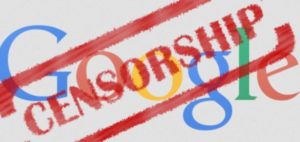
According to multiple reports, like the one coming out of The Wall Street Journal (WSJ), Alphabet Inc.’s Google will, alongside media platforms like Facebook, be altering the access to their advertisement selling software to “fake news” publications who utilize the service to drive revenues.
Google has said that they will update their policies to include a ban of Google ads being placed on websites which they consider to “misrepresent, misstate, or conceal information about the publisher, the publisher’s content, or the primary purpose” of the website. According to the WSJ article and a Google spokeswoman, this ban would also include sites that distribute “false” news.
The necessity of this change in policy appears to be driven by the affect of said “fake” new stories which spread on social media platforms, such as Facebook during the 2016 presidential election.
Many in the traditional media are arguing that cutting off the revenue via advertising access to these “fake” or nuisance sites could have a large impact in controlling this problem.
This policy change is not coming without push-back however, as there are many who see this as a form of censorship and a way to control dialogue. And while these organizations are private institutions which can act independent of the First Amendment on their medium, users and consumers of the products have valid concerns about how the entities will define, police and remove what they deem as “fake” news.
The libertarian website Reason even put out a rebuttal piece aptly titled, “Policing ‘Fake News’ Is Our Own Responisiblity, Not Facebook’s,” in which the author, Scott Shackford, gives examples of where these new policies can set a precedent to allow for not just private censorship but governmental as well. Even if some of the stories are false or misleading, simply due to the fact that the definition of “fake” is far too malleable.
Given that Facebook is now so influential in putting information in front of people, the result will most certainly be a push to define “fake” down in order to keep stories that harm certain interests from spreading. And so, yes, forget letting algorithms do all the work. Eventually Facebook staff will be put in a position of determining what is and isn’t “real” news. How many people think the Trump sexual assault scandal is fake? How many people think the Hillary Clinton email scandal is fake?
And then there’s the American ethnocentricness of it all. A newly released report from Freedom House indicates that internet freedom has been declining for the past six years due to government crackdowns on social media. Before asking Facebook to censor away fake news stories, ask yourself, “Will folks like me be the ones actually deciding what counts as fake news, or it will be powerful and connected government leaders?” I am very certain that Turkish President Recep Tayyip Erdogan would be very happy to tell Facebook which news stories are fake.
Does Reason’s Shackford have a point, or is Google right to censor using access to its advertising software? Leave your comments below.


21 comments
best online casino for money
virgin casino online nj login
online casino real money usa
best online casinos that payout
sildenafil viagra
viagra for women
online casinos for usa players
san manuel casino online
loans online
online payday loans
cash advance online
no credit check loans
quick cash loans
personal loans
viagra for sale
viagra prescription
cialis buy
cialis to buy
cialis buy
cialis to buy
cialis 20
cialis to buy
5 mg cialis
cialis 5 mg
play for real online casino games
online casino games real money
online slots real money
slot machines
vegas casino online
best real casino online
cheap viagra online
viagra online pharmacy
viagra without doctor
generic viagra reviews
sildenafil 20 mg
canadian viagra
buy tadalafil online
cialis online pharmacy
Viagra or cialis
Discount viagra online
… [Trackback]
[…] Info on that Topic: thelibertarianrepublic.com/google-censor-fake-news/ […]